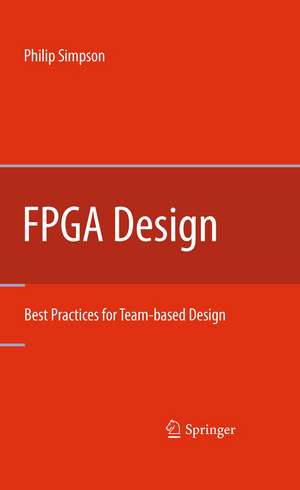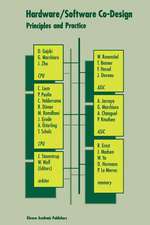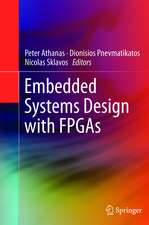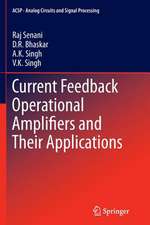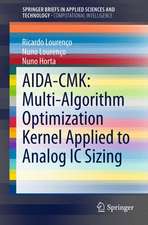FPGA Design: Best Practices for Team-based Design
Autor Philip Simpsonen Limba Engleză Paperback – 19 oct 2014
| Toate formatele și edițiile | Preț | Express |
|---|---|---|
| Paperback (1) | 529.92 lei 38-44 zile | |
| Springer – 19 oct 2014 | 529.92 lei 38-44 zile | |
| Hardback (1) | 640.24 lei 6-8 săpt. | |
| Springer – 11 aug 2010 | 640.24 lei 6-8 săpt. |
Preț: 529.92 lei
Preț vechi: 688.21 lei
-23% Nou
Puncte Express: 795
Preț estimativ în valută:
101.40€ • 104.61$ • 84.62£
101.40€ • 104.61$ • 84.62£
Carte tipărită la comandă
Livrare economică 22-28 martie
Preluare comenzi: 021 569.72.76
Specificații
ISBN-13: 9781489997890
ISBN-10: 148999789X
Pagini: 168
Ilustrații: XV, 151 p.
Dimensiuni: 155 x 235 x 9 mm
Greutate: 0.25 kg
Ediția:2010
Editura: Springer
Colecția Springer
Locul publicării:New York, NY, United States
ISBN-10: 148999789X
Pagini: 168
Ilustrații: XV, 151 p.
Dimensiuni: 155 x 235 x 9 mm
Greutate: 0.25 kg
Ediția:2010
Editura: Springer
Colecția Springer
Locul publicării:New York, NY, United States
Public țintă
ResearchCuprins
Best Practices for Successful FPGA Design.- Project Management.- Design Specification.- Resource Scoping.- Design Environment.- Board Design.- Power and Thermal Analysis.- RTL Design.- IP and Design Reuse.- The Hardware to Software Interface.- Functional Verification.- Timing Closure.- In-System Debug.- Design Sign-Off.
Notă biografică
Phil Simpson is Altera’s senior manager for software technical marketing and product planning. In this role, Simpson is responsible for Altera’s Quartus II software and third-party EDA interfaces product planning and the creation of the Altera design flow software roadmap. Prior to joining Altera in 1996, Simpson held several engineering roles at various EDA and semiconductor companies, including EDA Solutions, Data I/O and Lucas Aerospace. Simpson holds a BS (with honors) in Electrical & Electronic Engineering from City University, London and an MSC (with distinction) in system design from the University of Central England, Birmingham, England.
Textul de pe ultima copertă
FPGA Design: Best Practices for Team-based DesignPhilip SimpsonMany Companies struggle with establishing a working FPGA design methodology acrossdesign teams in their Company. As design teams become more dispersed globally, theneed increases for a standard design methodology. This book describes best practices forsuccessful FPGA design. It is the result of the author’s meetings with hundreds ofcustomers on the challenges facing each of their FPGA design teams. By gaining anunderstanding into their design environments, processes, what works and what does notwork, key areas of concern in implementing system designs have been identified and arecommended design methodology to overcome these challenges has been developed.This book’s content has a strong focus on design teams that are spread across sites. Thegoal being to increase the productivity of FPGA design teams by establishing a commonmethodology across design teams; enabling the exchange of design blocks across teams.Coverage includes the complete FPGA design flow, from the basics to advancedtechniques.• Presents complete, field-tested methodology for FPGA design, focused on designreuse across design teams;• Offers best practices for FPGA timing closure, in-system debug, and boarddesign;• Details techniques to resolve common pitfalls in designing with FPGAs.
Caracteristici
Presents complete, field-tested methodology for FPGA design, focused on reuse across design teams Offers best practices for FPGA timing closure, in-system debug, and board design Details techniques to resolve common pitfalls in designing with FPGAs
